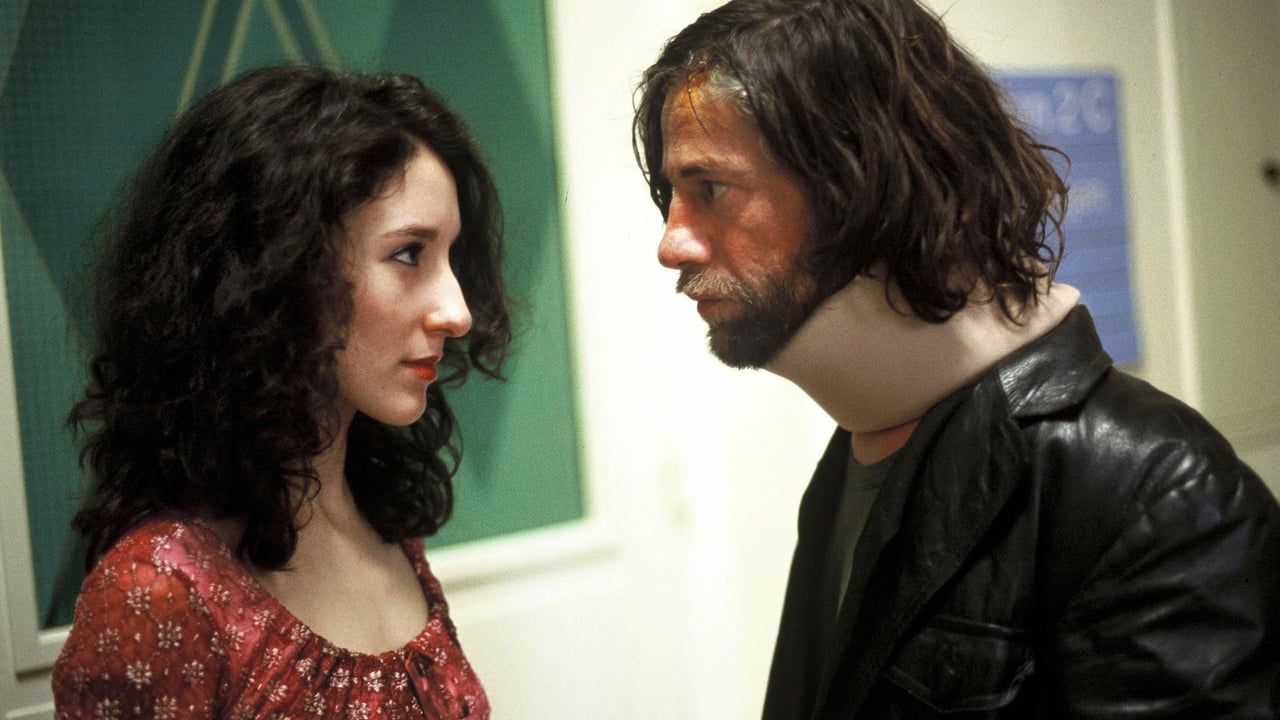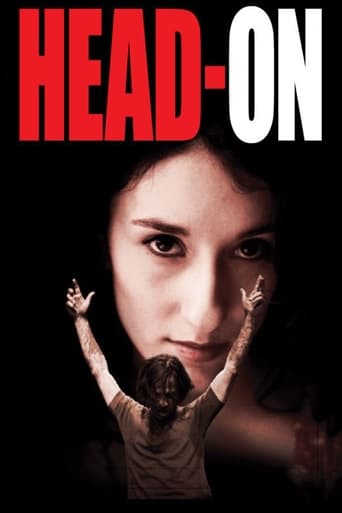SmugKitZine
Tied for the best movie I have ever seen
Evengyny
Thanks for the memories!
Myron Clemons
A film of deceptively outspoken contemporary relevance, this is cinema at its most alert, alarming and alive.
Phillipa
Strong acting helps the film overcome an uncertain premise and create characters that hold our attention absolutely.
kristaz
Since this is my first IMDb review, I am starting it with Head On. It is the only movie that I watched once through and when the credits rolled I just sat there, numbed, and decided to watch it again, and hit play and watched it a second time. I don't think that I even got up to go to the bathroom. I couldn't move. I didn't want to move. I just wanted to watch this again.There is just 'something' about this film. The crazy intro, the lead actor that you wonder the whole time if he's just some alcoholic that they pulled off the street to play the part, the eclectic combination of Turkish and German mashed as one, the genuine love, the genuine hate, the love of life, the desire of death, the humanness of it all. With out a doubt, this is a movie to watch. Again.
Horst in Translation (filmreviews@web.de)
"Gegen die Wand" is a German/Turkish 2-hour film from over 10 years ago. It was not the breakthrough movie for writer and director Faith Akin, but it is probably his most famous work so far, and his most successful. It won big at the German Film Awards, European Film Awards and several other awards bodies, even if it was not chosen to represent Germany in the Foreign Language Oscar race. That's not a problem though as I don't believe this is a movie the Academy would go for. It was a bit of a breakthrough film for lead actor Birol Ünel and a definite breakthrough for Sibel Kekilli, who you may have seen not too long ago in "Game of Thrones". Lets talk a bit about the characters they play. Ünel plays a Turkish man who has basically fully adapted to life in Germany, without culture or religion. Without his name, you could think he is actually German. He also does not look really Turkish. But he is. And that is crucial as Kekilli's character wants to marry him in order to find peace with his traditional family. However, in reality and spirit, she is very much alike to her fake husband. She wants to have fun, sleep around, party etc., just live the life.Both main characters have a talent for being self-destructive. The male has severe anger management issues that result in a moment which changes everything. The female has a drug problem, but is also too free-spirited for her own good, which may cost her everything on several occasions. Both lead actors play their parts very well and are the heart and soul of the film. The perception that Ünel is the only real lead becomes flawed when the actions starts focusing almost entirely on Kekilli's character two thirds into the movie. There are some very tense scenes in here and this may not be a good watch for younger audiences.I wrote earlier that this is probably Akin's most known film. He has worked on several films that combine German (locations) with foreign (for example Greek and Italian) culture. Here we get his take on his very own roots as you can easily see by his name. It is probably also his most serious film. Many of his works have a fair share of humour and comedy attached to them. "Gegen die Wand" does not and that is perfectly fine, even if it's not the best choice to represent Akin's generally lighter body of work. I think it would not have fit the tone at all. This is a really good dramatic character study and I also liked that he does not go for a forced happy ending by any means. It also fits the description of my review. The movie deals almost exclusively only with the time in the two protagonists' lives, during which they know each other and deal with one another. At the end, he is her way into her past, into a world, in which she may be free, but is it worth sacrificing her present for this new life? It's a question you will have to answer for yourself just like Sibel did. A pretty good film and I recommend the watch. Quite tense from start to finish.
gavin6942
Cahit Tomruk (Birol Unel) and Sibel Guner (Sibel Kekilli) are immigrant Germans who live and work in the port town of Hamburg. In a bid to help Sibel break free of her family (which strictly adheres to Turkish customs, religious and otherwise), the couple decides to marry. But straitlaced families are just part of the problem; Cahit and Sibel must also counterbalance ancestral roots with their new life in a western democracy.The film starts with a very surreal opening with a band performing a song about unrequited love on the beach in a foreign land. This band returns a couple times throughout the movie. Why? Perhaps to remind us of the foreign nature of Turkey, or simply to maintain the surrealism.This is a Turkish-German hybrid, with a forced marriage to boot. We might be familiar with American stories of people marrying to become citizens. But here, for Americans, we have a double foreign atmosphere -- Germany, with Turkish immigrants. A foreign culture for most of us, with an even more foreign culture mixed in. The story is a universal, timeless one, but in a whole new setting.Some social topics such as sexual intimacy and fidelity are brought up, that I think bear discussion. The wife insists on sexual promiscuity, but refuses to sleep with her husband. The husband, on the other hand, sees the marriage as real and does not pursue other women, though he receives no affection at home. Ironically, the person from the more strict culture has a permissive moral code, and the liberal partner is strict.I enjoyed seeing the game of Rummikub show up, but have nothing further to say about it. (Rummikub was invented by Ephraim Hertzano, a Romanian-born Jew, who immigrated to Mandate Palestine in the early 1930s. Does this have anything to do with the story? Probably not.)Things get worse around the middle of the film, and this is where the original title ("Into the Wall") begins to make sense. I will not get into it for fear of ruining the plot, but this is when the film goes from good to great. I think the third act is somewhat weaker, but seeing the two adapt to married life (with their own unique versions) is a visual treat.
dromasca
I have previously seen only one film by director Faith Akin 'Crossing the Bridge: The Sound of Istanbul' - a documentary full of love for the city of Istanbul and its music, which had made me wish to visit this place where I have never been. 'Gegen die Wand' is a fiction movie, and a very different strong and ambitious one. It's the story of two Turkish immigrants in Germany, a man over 40 and a girl half his age entering a marriage of convenience so that the girl can escape the pressure of the family to enter into a convenience marriage and can live a 'normal' 'free' life. When the pretended marriage develops their love will play both the role of savior and destruction. They will be saved as love gives sense to their destinies marked by disorientation and suicidal tendencies, they risk to be destroyed as in a very melodramatic but but still believable twist of fate they will never be able to fulfill their feelings into common fate. They will be save but pursue of happiness needs to happen on separate paths.I liked the film, and I believe that its charm resides in the fact that the director does not refuse but instead adopts the ways, sounds and eventually images (the first half of the film happens in Germany, the second one in Turkey) of the Turkish cinema. Story telling takes what it needs from the oriental melodrama and combines it with modern cut and discrete acting. We do have musical prologues, intermezzo and finale, all filmed in a conventional touristic like manner on the shores of the Bosporus, just underlining the drama of the music and of the text in an operatic manner. We are being taken into the Turkish enclave in Hamburg, and in the fascinating combination of old, new, sea and colors so well known for everybody who visited and loved the cities around the Mediterranean. Birol Ünel and Sibel Kekilli give strong performances and the overall film atmosphere gives a feeling of authenticity and sincerity. The social commentary is sharp and not forgiving when it comes to the conflicts between the traditional and the modern societies. This was my first experience with a Turkish fiction film and a very positive one.

